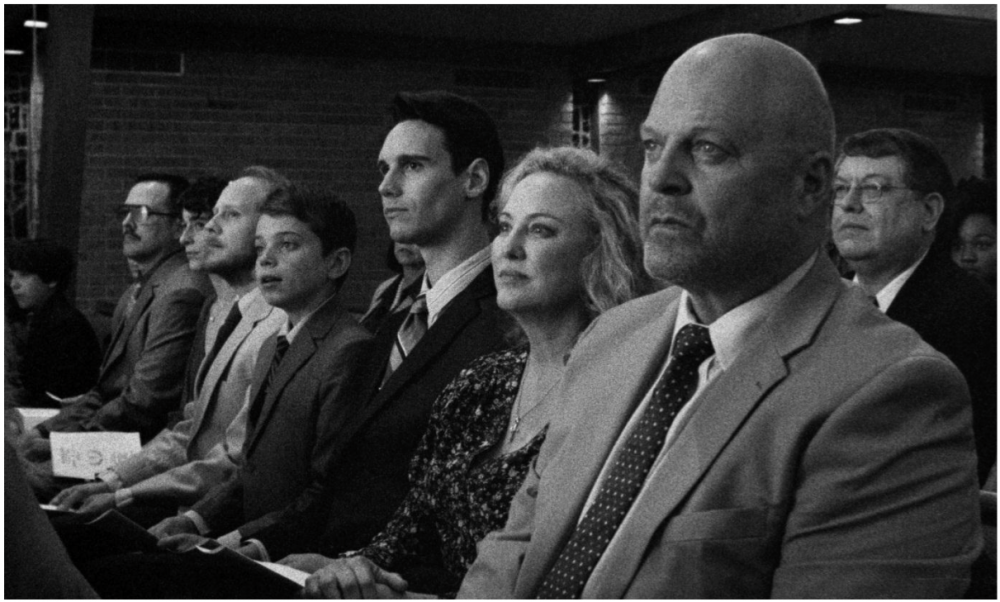We all lie. In one form or another everyone has said something inherently false; whether this is to get out of a chore, or to avoid the inevitable – we’ve all done it. Sometimes we lie to avoid the inevitable, and sometimes we lie to protect those we love. The reality is that lying to those we love and those we know requires an intimacy far greater than lying to an acquaintance or a random person on the street. As a result, many relationships can be destroyed by a few words that really might not mean much; or, words that need to be said might be avoided to subvert a potential emotional backlash. It is these lost words and lost moments that we regret for the rest of our lives. 1985 shows us how destructive a lie can putatively be. More importantly, it places an emphasis on what lies can do to a liar. Big or small, lies can haunt you just as they haunt Adrian (portrayed beautifully by Cory Michael Smith); leaving holes that might have been filled by the truth.
1985 (directed by Yen Tan) stands as a shining example of what filmmaking can do to enhance emotion. Shooting exclusively on black and white super 16mm film, the movie begins with a feeling that many would see as outdated. To the contrary, the black and white imagery adds a quality to the film that exaggerates the intimacy between actor and audience. The way that Tan utilises the camera to intensify these emotions is what really differentiates 1985 from many other films. While 1985 may be superficially compared to other contemporary films that delve into emotion and sexuality, what it delivers is something completely unique. The way scenes are shot evokes a mixture of Wes Anderson and Paolo Sorrentino. This comparison arises due to: first, the stunning staging of the scenes; a few shots seem to be so well planned that they look like an art piece ready to hang on your wall. Second, the movement of the camera (while being static for quite a few shots) was so well planned out and executed that somehow there was no need to cut a shot short, instead relying on the emotional impact of the scene. By using longer takes the emotion takes on a whole new level of nuance that elevates the compassionate atmosphere created by the actors’ performances. One scene stood out in particular: where Adrian looks for his mother. Eileen, (acted stunningly by Virginia Madsen), waits in her son’s bedroom, and the emotional connection both of the actors have creates a beautiful scene. That being said, there were some editing choices that could be picked upon; but, despite some jarring cuts, the scenes managed to connect to each other quite cohesively.
The depiction of Adrian was phenomenal, but what really stood out was the restraint with which the film was created. 1985’s approach is much more toned-down when compared to the glitz and glamour of current films tackling homosexuality. It doesn’t bash you over the head with a stick about sexual freedom. Instead it is this toned-down approach that establishes a conduit for understanding. This film examines the complications that arise from sexuality within the context of a conservative society. The story itself takes you to a relatable place and makes you wonder what the people around you are really going through. The performance of the whole cast further aids this subtle approach. With some amazing acting in the cast, most notably with that of Corey Michael Smith, the story grounds itself in realism. It is this guiding method, as opposed to the forced exhibition of an individual’s struggles that made the film refreshing and unique.
Indeed, if 1985 were to be compared to a classic story or film it would be Harper Lee’s To Kill a Mockingbird. Tan tackles an emotional topic through the social dynamics of a family. While in some cases pandering to stereotypes a little too much, such as the father’s approach to his military service, the story centres on how Adrian could interact with his family without revealing the lie he had hidden both metaphorically and literally within himself. This focus on familial wellbeing introduced a traditional premise, but twisted it into an original story centred on the dramas that can arise from a lie that needs to be undone.
Yen Tan creates something that is genius, that something being 1985. The blend of familial unrest and social agitation regarding a topic such as homosexuality is wholeheartedly distinctive and new. Tan leaves you with tears and questions. Because with questions come answers, and with answers come reflection on what you have done in your own life. Have you lied? Have you hurt someone you love? Have you neglected to tell someone how much they mean to you? Tan uses this kind of reflection to make us wonder about the people we know. He asks us to reconsider the potentially destructive opinionated ideals we once had. He asks us to change, and to accept people so that they do not have to lie just to feel like they can fit in.

